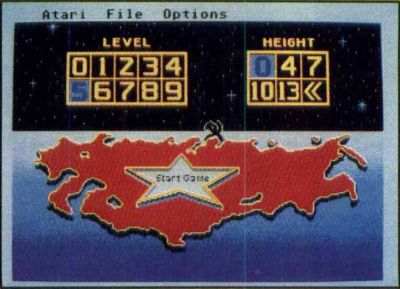Tetris
Spectrum Holobyte
2061 Challenger Dr.
Alameda, CA 94501
(415) 522-1164
$34.95, Color only
Reviewed by Ian Chadwick
I was sitting in the Arbat Cafe on Kalinin
Prospekt one night eating some zakuski when a KGB colonel, Yuri Lysenko, of the First Chief Directorate came to my table. I thought he was there simply to check my propiska, but he waved them away with no apparent interest. Instead, he asked if he could join me. One doesn't say no to the KGB, so I offered him the vacant chair. He sat down and signaled for the waiter to bring a bottle of Zolotoye Kolsto to the table.
The night lights from Red Square sparkled off the sluggish waters of the Moscow River and the metallic trill of a balalaika filled the air. Between salty spoonfuls of beluga caviar and hefty gulps of vodka, we discussed how glasnost was affecting his job. After all, if America was no longer the "Great Enemy" and the USSR was not the "Evil Empire," what purpose could there be in a huge, state-run espionage and security network?


Colonel Lysenko smiled at me. "We have not yet given up the hope of conquering you capitalists," he said as he produced two fat Cuban cigars.
I shook my head at the offer and replied smugly, "Well, if you can't do it through world revolution and subterfuge, then how? Surely you can't compete in the world markets. Your commercial production levels are far behind those of the West. You can't even supply your own people with the consumer goods we manufacture by the millions."
"True, we do not have the means to outproduce you, except in arms. But we have found a weakness, a critical flaw in your society that we can exploit."
"You feel secure enough to tell me, a journalist, this?" I figured it was just more disinformation, a soviet specialty.
"Of course. No one will believe you if you make it public. And even if they do, your culture is powerless to stop us."
"And what is this diabolical device you have?"
He blew a cloud of blue-grey smoke into the air and looked at me, eyes twinkling. "A game."
"A game? You mean like base-ball? Come on, colonel, you can't be serious."
"Not a sport. A computer game."
That stopped me. A computer game? Who could ever imagine the dour, phlegmatic Russians at AcademySoft producing a computer game? Through my mind raced an image of American teenagers grappling daily with joysticks as the action heated up on a million videoscreens across the country. I hadn't seen even an XEGS in Moscow. Who was he kidding? Besides, what sort of game could they create? One about queuing in lines for bread? About the bureaucratic angles behind exit visas? "What kind of game?" I asked sarcastically. "Are you going to tell me you've invented PacMan?"
"Nothing so coarse. It was created at our Academy of Sciences, but no one realized the commercial potential until a copy of it was installed in our central computer system and brought to my attention."
"What's the game about?" I had to admit, he had my attention.
"It's simple, really. Almost a toy. Groups of blocks fall from the top of the screen toward the bottom. The groups are simple collections of four square pieces,"—he lined up sugar cubes on the tablecloth to illustrate—"seven different groups. Your job is to rotate and move them as they fall so that they fit the best in the growing piles. When you fill a row completely with squares, it disappears and everything moves down one.
"Points accrue according to how far and how fast the pieces fall into place. When you remove enough filled rows, the level increases, and as it does, so do the game speed and the points awarded. There are nine levels, of which I've run through eight, but nine challenges the limits of my reflexes."
An admission of weakness from a KGB officer? Not likely. It sounded more like a challenge. And accustomed to the high-res graphics and action of video games in the West, I didn't think his description was even vaguely exciting. "Sounds easy to me." Not to mention boring.
He smiled that grin again, like a cat that's just cornered a particularly tasty mouse and is savoring the moment before the real fun begins. "Would you care to try it?"
"Of course." I took the bait.
We went in his car, a black Volga, for the short drive to Dherzhinsky Square. I was a little worried when we stopped in front of the infamous Lubyanka building, but it was only to let his driver go. He steered me away from the KGB headquarters to the doors of Detsky Mir, the giant children's store across the street. Inside, he flashed his badge and took me to a small display on the second floor, where a suspiciously familiar computer, the Atariski Soyuz, was on display. In front of all the screens were familiar western faces: fellow journalists and embassy staff, pushing and shoving each other for a chance to play again. They looked haggard, glassy-eyed.
I moved closer to watch. It looked easy. Too easy. But the players were obviously hooked. What was the gimmick? Subliminal imagery? Subsonic sound?
I nodded my head. The guards rudely shouldered one of the players out of his seat and offered me the chair. The man protested weakly, but subsided at the sight of my host's uniform. I sat down and flexed my fingers. These were the hands that broke a million in Asteroids. Surely, little tumbling blocks would not defeat them!
The blocks began to fall. I lined them up and dropped them into their slots with a tap of the space bar. Nothing to it. They were falling too slowly. I started to get impatient, anxious for the blocks to come faster. Level two passed, then level three. The action was speeding up. I was conscious that the other games around me had paused as everyone watched my progress.
At level five I ran into trouble. I missed a slot and built up a pile of unfinished rows that might have doomed me, but I managed to get them settled and gone before the next level came.
At level six I began to sweat. The blocks were falling steadily, and I didn't have long enough to line them up and drop them into place. Still, I managed to make it to the end, although the bottom of the screen was littered with incomplete rows.
Level seven. My hands were shaking, my mouth went dry. Blocks fell like rain. I twisted them, slid them among their fellows, but not enough. I misjudged once too often. The tower of incomplete rows reached the top of the screen and the game ended. I sat back and sighed with a mixture of relief and frustration. Almost! The polite patter of applause surrounded me. Not bad for a beginner.
I couldn't stop there. I had to try again, break the barrier, crash through to the eighth level. No one complained as I started again. And again. And again. Somewhere in my head I heard laughter, and knew it was for me.
Early the next morning they finally dragged me away—I was still only on level eight. I was the only one playing; the store had long since closed and my KGB escort was left to take me back to the Rossiya Hotel. In my dreams, my fingers twitched as I stroked the keys. I knew Colonel Lysenko was right. We had no defenses against this thing. Once it hit the shelves, we'd be helpless addicts, mindlessly tapping the keys until we fell to the floor, victims of the deadly game as the Red Army marched in to effortlessly conquer us. I awoke, my body aching and sore. My fingers wouldn't stop wriggling as they played an imaginary keyboard.
I picked up the phone and called Colonel Lysenko. I had to play again. One evening and I was hooked.
"Did you enjoy my little demonstration?" He sounded tired. In the background I could hear him typing.
"Lysenko, I don't care what it costs. I must get a copy of that game."
He laughed, an unpleasant sound. "You'll have one soon, I promise. We've launched it in the West under the name Tetris. It should be available by the time you return home."
"You fiends!" I shouted. But Lysenko didn't respond. I listened carefully, thinking he had hung up, but I could hear his breathing and the incessant tapping of the keys in the background. Keys? Wait a second! "Lysenko, are you playing that game?"
"Yes," he muttered dejectedly.
"You mean...?" Then it struck me. The copy installed on the central KGB computer system! "You're hooked too?
"But why did you do this to me?"
"We hoped you'd prove immune. We figured if we could find someone who didn't get addicted, we could discover an antidote." He growled and cursed softly. I could picture the blocks falling on his screen.
"And now?"
"Now we keep looking." He hissed at his computer, and I lost his attention. I hung up the phone and tried to roll back to sleep, but the game tugged at me, demanding. It was going to be a long week, but I was determined not to let it get to me as it had overtaken him. I refused to be its next victim.
A few weeks later, I was out of Russia and home. I stopped at a small computer shop on Toronto's Yonge Street to buy a recent copy of ST-LOG. Inside the computer shop, I found the employees wandering around aimlessly, looking dazed, unresponsive. I knew why immediately: A copy of Tetris lay open on the counter and was being played on every computer in the store. I started to back out, but something wouldn't let me. My fingers began their dance. I couldn't stop myself. It was like a magnet pulling me to the keyboard. I sat down and the blocks began to fall....
# # #
First there was The Spy Who Came in From the Cold, then there was Red Storm Rising, and now there's Tetris, the first piece of Soviet software to make its way across the ocean to the commercial wonderland of capitalist marketing. It's so basic in concept that it brought a sneer of contempt to the face of one employee at a computer store when I asked about it. He took one look and dismissed it as irrelevant. Too bad he never played it before he short-shrifted it. Tetris is annoyingly simple and intensely addictive. I love it.
It was developed, as mentioned, by Alexei Pazhitnov and Vadim Gerasimov of AcademySoft, the Computer Center of the USSR Academy of Sciences. It has been a major success on the PC and Mac already. There are several additional features, including high-score, clear and save, help, next-shape and statistics displays, tournament play and advanced (faster) mode.
Tetris is one of the best games on the ST, bar none—challenging, demanding and nonviolent. I highly recommend it.

Ian Chadwick is a Toronto-based technical writer who lives in an increasingly small house with his wife, Susan, six cats, one dog, two rats and several field mice (which moved in recently despite the cats). And that's not to mention the neighborhood's stray cats, which take up residence as the mood moves them.